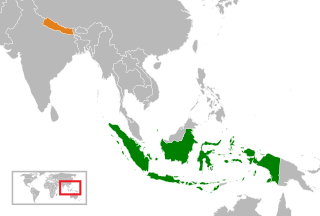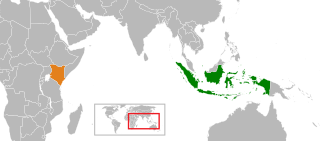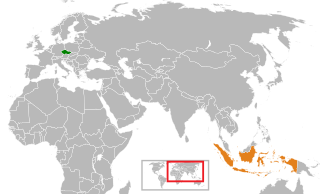Trade and investments
The value of bilateral trade between the nations in 2013 is US$260 million. [5] In 2011, trade balance between Indonesia and Switzerland was in favour to Switzerland, that recorded 277.1 million Swiss francs (US$299.077 million) trade surplus. Indonesia's export to Switzerland stood at 162.6 million Swiss francs (US$175.48 million), mostly consists of textiles, garments, and footwear, while Swiss' export to Indonesia are mostly industrial machinery, valued 439.7 million Swiss francs (US$474.568 million).
In 2010, Swiss direct investment in Indonesia reached 7 billion Swiss francs (US$7.55 billion), most of them invested by Swiss corporates operating in Indonesia. [1] Currently there are around 70 Swiss companies operate in Indonesia, employing around 45,000 workers. Swiss corporates in Indonesia dominate the food, pharmaceutical, agricultural biotechnology, banking and insurance sectors. For example, Nestlé is among the dominant food company in Indonesia and operates three factories in the country. [5]

Since independence, Indonesian foreign relations have adhered to a "free and active" foreign policy, seeking to play a role in regional affairs commensurate with its size and location but avoiding involvement in conflicts among major powers. During the presidency of Sukarno, Indonesia's foreign relations were marked by engagement with other newly independent nations in Asia and Africa, as exemplified by the Bandung Conference, the subsequent foundation of the Non-Aligned Movement and a confrontational attitude towards Western powers, justified by a belief in the CONEFO and opposition to what Sukarno termed as NEKOLIM.

Switzerland is not a member state of the European Union (EU). It is associated with the Union through a series of bilateral treaties in which Switzerland has adopted various provisions of European Union law in order to participate in the Union's single market, without joining as a member state. Among Switzerland's neighbouring countries, all but one are EU member states.

Diplomatic relations between Switzerland and the United States were established in 1853 by the U.S. and in 1868 by Switzerland. The first diplomatic representation of the U.S. was established in Basel in 1853.

Foreign relations exist between the alpine nations of Austria and Switzerland. Both countries have had diplomatic relations since the Middle Ages. The Habsburgs, who ruled Austria for more than six centuries, are originally from Aargau, Switzerland. The two countries are predominantly German-speaking. Austria has an embassy in Bern, a general consulate in Zürich and seven honorary consulates. Switzerland has an embassy in Vienna and six honorary consulates. Together, both countries organized the Euro 2008.

Swiss–Turkish relations are foreign relations between Switzerland and Turkey. Switzerland has an embassy in Ankara and a consulate-general in Istanbul. Turkey has an embassy in Bern and consulates-general in Zürich and Geneva. Both countries are full members of the Council of Europe, the OECD, the OSCE and the WTO.

Indonesia and Laos established diplomatic relations in 1957. Indonesia has an embassy in Vientiane, while Laos have an embassy in Jakarta. Indonesia supported and welcomed Laos membership to the Association of Southeast Asian Nations (ASEAN) on 23 July 1997. Laos and Indonesia agreed to enhance relations to focus on exploring the potential of both nations to cooperate on trade and investment. The two nations expressed a desire to reach further agreements relating to security, tourism, sport, air transport and education. The two sides will also work together in cooperation with other ASEAN nations to ensure the ASEAN Community is established in 2015.

Indonesia and Sri Lanka established diplomatic relations on 6 August 1952. Indonesia and Sri Lanka are members of numerous organizations such as the World Trade Organization and Indian-Ocean Rim Association. They are also founding members of the Non-Aligned Movement. Indonesia has an embassy in Colombo, while Sri Lanka has an embassy in Jakarta.

Indonesia and Nepal established diplomatic relations in 1960. Neither country has a resident ambassador. Indonesia has only established an honorary consulate in Kathmandu, while its embassy in Dhaka, Bangladesh, is also accredited to Nepal. Nepal has accredited its embassy in Kuala Lumpur, Malaysia, also to Indonesia. Both nations are partners and founding members of the Non-Aligned Movement (NAM).

Indonesia and Suriname established diplomatic relations on 24 January 1976. Both had a special relationship, based upon shared common history as former colonies of the Dutch Empire. Large numbers of Javanese migrated to Suriname to work on plantations during the late 19th and early 20th-centuries. Indonesia has an embassy in Paramaribo also accredited to the Co-operative Republic of Guyana, while Suriname has an embassy in Jakarta. Indonesia and Suriname are members of the World Trade Organization (WTO) and Forum of East Asia-Latin America Cooperation.

Indonesia and Kenya established diplomatic relations on 15 October 1979. Indonesia has an embassy in Nairobi, also accredited to the Democratic Republic of the Congo, Somalia, and Uganda. On 18 March 2022, Kenya established its embassy in Jakarta. Both nations are partners in multilateral organizations, such as the World Trade Organization (WTO), Non-Aligned Movement and the Indian Ocean Rim Association.

Indonesia and Morocco established diplomatic relations in 1960. Both are the Muslim-majority countries; Indonesia is the most populous Muslim country in the world, while Morocco is also a Muslim majority nation. Morocco praised Indonesia as a strong democratic nation, and pointed out that both nations face the same challenges of separatism and terrorism. Diplomatic relations were established in 1960. Indonesia has an embassy in Rabat and a consulate in Casablanca, while Morocco has an embassy in Jakarta. Both nations are members of the World Trade Organization (WTO), Group of 77, Non-Aligned Movement and Organisation of Islamic Cooperation (OIC).

Indonesia and Venezuela established diplomatic relations in 1959. Since then, both countries enjoy friendly ties. Both nations agreed to expand the trade and investment relations, especially in tourism, technology, chemicals and natural gas sectors. Indonesia has an embassy in Caracas, while Venezuela has an embassy in Jakarta. Indonesia and Venezuela are members of multilateral organizations such as the World Trade Organization (WTO), Non-Aligned Movement and Forum of East Asia-Latin America Cooperation.

Algeria and Indonesia established diplomatic relations in 1963. The relationship is mostly founded on common religious and anti-colonialism solidarity, as Indonesia and Algeria are Muslim-majority countries that also once fell under colonialism. Algeria recognized Indonesia's role on supporting their country on gaining independence in 1962. Both countries agreed on expanding cooperations and strengthening relations. Algeria has an embassy in Jakarta that also accredited to Singapore and Brunei, while Indonesia has an embassy in Algiers. Both nations are members of the Non-Aligned Movement, Group of 77 and Organisation of Islamic Cooperation (OIC).

Austria and Indonesia established diplomatic relations on 20 November 1954. Austria recognizes Indonesia as a stable and reliable partner, and both countries enjoy excellent relations. The two nations have agreed to expand relations in business, trade and investment, tourism, culture, environment and green technology. Austria has an embassy in Jakarta and honorary consulates in Yogyakarta, Bandung and Surabaya, while Indonesia has an embassy in Vienna that is also accredited to Slovenia.

Indonesia and Tanzania established diplomatic relations on 25 January 1964. The relations between both nations are mostly in the agriculture sector, where Indonesia provides training for Tanzanian farmers. In 2011 both countries established Indonesia-Tanzania Joint Agriculture Cooperation Committee (JACC), as a vehicle to improve agricultural sector co-operations, such as capacity building through training, joint research, and the expansion of market access to agricultural products. Indonesia has an embassy in Dar es Salaam. Tanzania has a non-resident ambassador in Kuala Lumpur, Malaysia. Since 2023, Tanzania had opened an embassy in Jakarta. Both countries are members of multilateral organisations such as World Trade Organization (WTO), the Group of 77 and Non-Aligned Movement.

Germany and Indonesia established diplomatic relations in 1952. However, relations between the people of Germany and Indonesia has stretched back to 19th-century when a large number of German nationals migrated to Dutch East Indies.

The Czech Republic and the Republic of Indonesia established diplomatic relations in 1950. Both nations have agreed to forge ties to deepen relations, especially in the business and trade sector. Indonesia has an embassy in Prague, while the Czech Republic has an embassy in Jakarta that is also accredited to Brunei, Timor Leste and ASEAN.

Ecuador–Indonesia relations refer to bilateral relations between Ecuador and Indonesia. Relations were established on 29 April 1980; however, it was not until November 2004 that Ecuador established its embassy in Jakarta, and reciprocating 6 years later on November 11, 2010, that Indonesia finally opened its embassy in Quito. Both countries are the members of Forum of East Asia-Latin America Cooperation and Non-Aligned Movement.

Indonesia and Norway established diplomatic relations on 25 January 1950. Since then, Indonesia and Norway has been cooperating in areas, such as climate and energy, democracy and human rights, international political issues and trade. Both nations has agreed to establish a strategic partnership against poverty and climate change, and also in promoting democracy and tolerance. Indonesia has an embassy in Oslo, while Norway has an embassy in Jakarta.

Foreign relations were officially established on 24 September 1992. Azerbaijan appreciates Indonesia's support in international forums on Azerbaijan's position regarding the Nagorno-Karabakh conflict.























